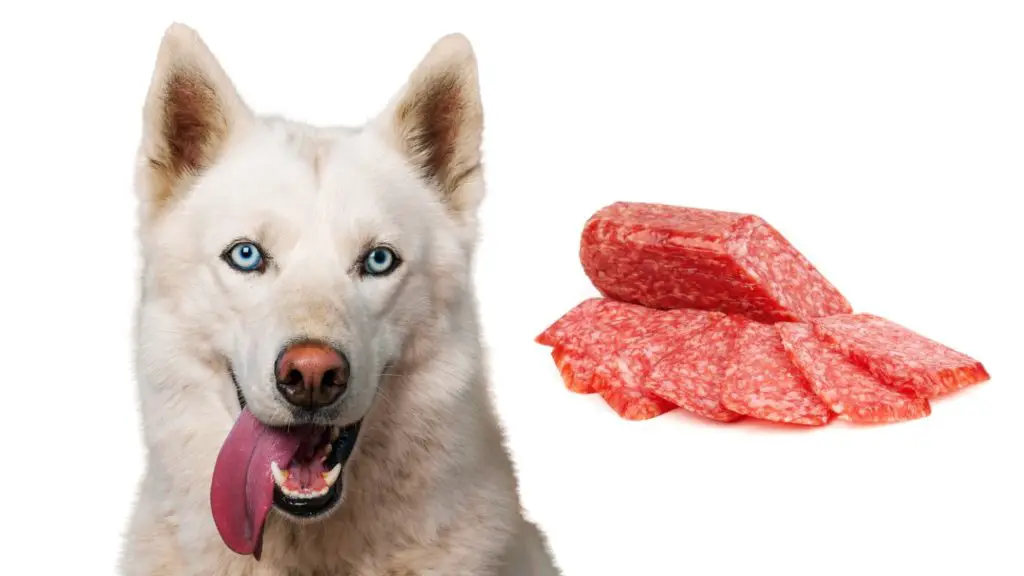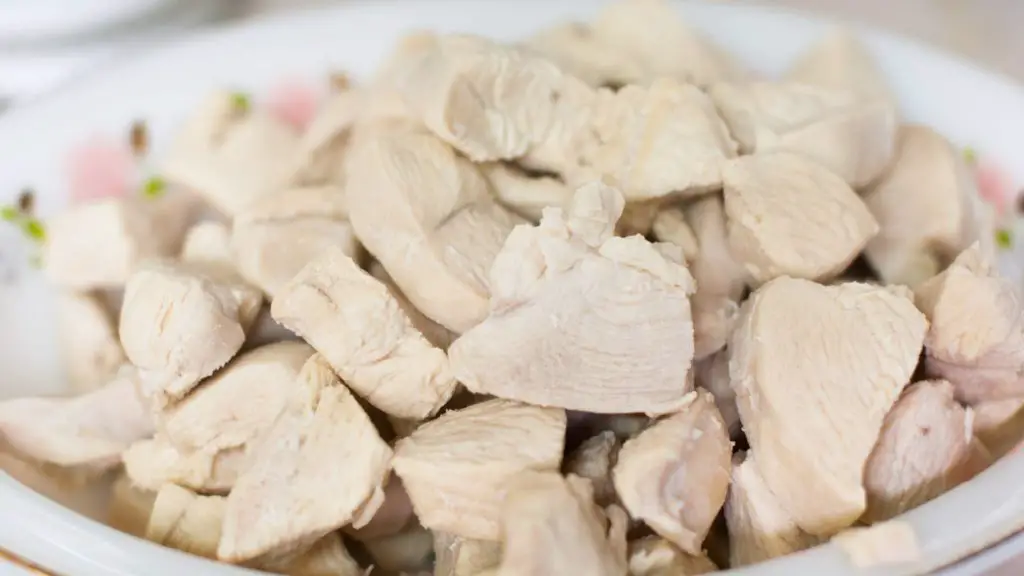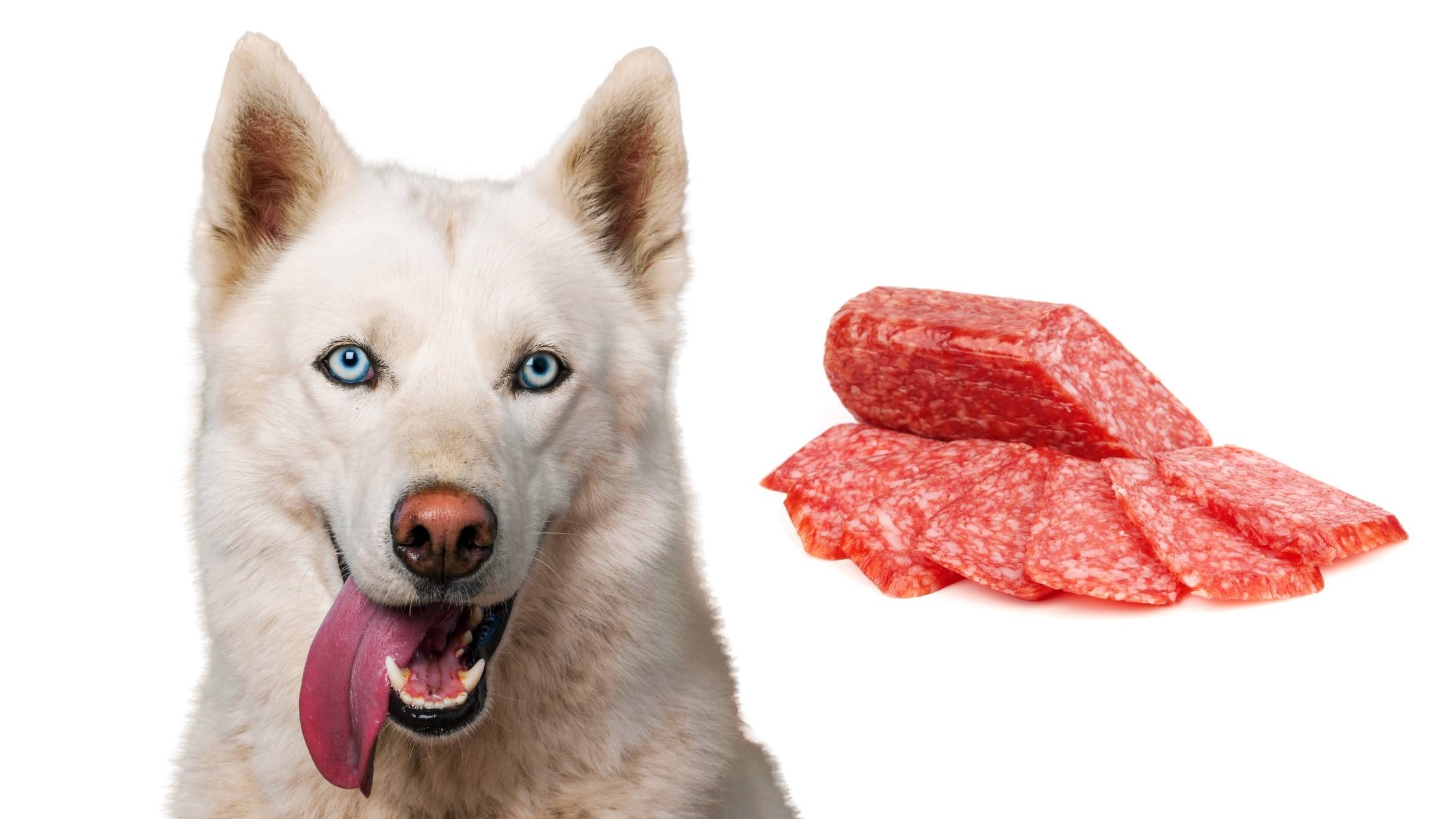Last Updated on 04/13/2022 by Veronica Jones
It’s a known fact that dogs love to take an interest in and try, human foods. But some foods are not designed for doggy consumption and can make your pup sick, evening causing significant harm if consumed by your canine friend.
Is salami a food that should be avoided by dogs? Can dogs eat salami? What are the risks?
We answer these questions and more, revealing the health considerations to keep in mind when it comes to dogs and salami.
What is salami?
Salami is a cured sausage meat made from either pork or beef. A fermentation and drying process preserves and flavours the meat, which makes it safe for humans to eat without cooking. The main ingredients found in salami is meat, fat, salt, garlic, spices and vinegar. So, can dogs eat salami slices? Let’s find out.

Can dogs eat salami?
No, dogs should not eat salami. Whilst it’s not toxic to canines, this processed food contains dangerous levels of salt, fat and seasoning that can damage your pet’s health and make him extremely sick. Each dog will react differently to salami, so it’s important to know the risks involved with feeding your pup salami before giving him a slice.

Why is salami harmful to canines?
Salt
Excessive salt consumption in dogs is dangerous. Their digestive systems can’t digest it in the same way as a human’s body can. Consuming salami in large quantities could affect your dog’s health and cause digestive and kidney problems.
Salt poisoning in dogs should be treated as a medical emergency. Contact your veterinarian if you think your pet has consumed too much salt or shows any of the signs of salt poisoning listed below.
If a dog eats too much salt, he will naturally try to drink more water to quench his thirst and prevent damage from being done to his body. However, if your pooch ingests large amounts of salt too quickly, the cells in a dog’s body start to release water to try to balance the excess amount of salt. This process damages brain cells and can cause
neurological symptoms such as headaches and seizures.
Symptoms of salt poisoning in dogs
• Stomach pains
• Loss of appetite
• Swollen tongue
• Vomiting
• Diarrhea
• Convulsions
• Extreme thirst and urination
• Muscle spasms
• Loss of energy and appetite
• Difficulty breathing
If your pup experiences salt poisoning, he may need IV fluid therapy and electrolytes to control dehydration. Your vet will gradually adjust the salt levels in your dog’s body to avoid a sudden change in sodium levels, which can cause a heart attack or brain swelling.
Spices
Cured meats, including salami, often contain spices such as pepper, onion or garlic powder and paprika that are highly toxic to dogs.
Garlic contains thiosulfate that deprives the red blood cells in a dog’s body of oxygen, causing them damage. Vomiting, diarrhea, excessive salivation and mouth irritation, may be early signs of toxicity in dogs. The most dangerous part of these herbs can damage your pup’s red blood cells, preventing oxygen from being carried around his body. A rapid heart rate, panting, weakness and discoloured urine are all signs that your dog has eaten something he shouldn’t and an emergency trip to the vet is required.
Onions – this vegetable contains a toxic ingredient called N-propyl disulfide and should not be eaten by canines as it could lead to onion toxicity in dogs.
If your dog has eaten onions, he may show some of the following symptoms:
• Lack of appetite
• Pale gums
• Lethargy
• Fainting
• Red urine
If you think that your dog is experiencing onion toxicity, you must take him to a vet immediately. In severe cases of onion poisoning, your dog may need a blood transfusion. It can even be fatal depending on the quantity of onion consumed.
Vinegar
Canines and vinegar do not mix well. It can cause gastrointestinal upset if ingested, especially in small dogs or dogs who have sensitive tummies. If your pup has kidney disease, vinegar or foods that contain vinegar should be kept well away from your pet as it could have a serious effect on your dog’s body functions.
Wine
Alcohol can be deadly to canines and should be treated as an emergency. Whilst it’s unlikely that the curing process of salami contains enough alcohol to cause your dog significant harm, it’s worth being aware of the signs of alcohol toxicity. Depression, lethargy, drooling, retching or vomiting, weakness, collapse, low blood pressure and a decreased respiratory rate are all common signs that your pup has consumed alcohol.
Additives
Processed food such as salami and other deli meats typically contain additives and preservatives to extend their shelf life and make the flavours more intense and addictive. If your pooch consumes food that is high in additives, it can also lead to diabetes.
Diabetes can be hard to reverse in dogs, which is why it’s important to prevent diabetes rather than try to treat it. Early signs of diabetes in canines include:
• Increased hunger and thirst
• Urinating more
• Weight loss
• Low energy levels
If untreated, diabetes can develop into a condition called diabetic ketoacidosis (DKA) that can cause vomiting, diarrhea, collapsing and not eating. If your dog shows any signs of DKA, you should speak to your vet who will provide veterinary advice.
Fat
When a dog consumes too much fat, his pancreas can become inflamed and lead to a condition called pancreatitis. Processed foods can often cause diarrhea and vomiting in dogs as their digestive systems are not used to breaking down high levels of fat found in salami.
High levels of fat in a dog’s diet can cause weight issues and obesity. Overweight dogs are at an increased risk of arthritis, back problems, breathing difficulties and even some types of cancer.
Sugar
Sugar is often used to sweeten deli meats such as salami. Cavities, upset stomach, weight gain and diabetes are just some of the health conditions caused by eating too much sugar. Long term effects of excessive sugar consumption can harm your dog’s teeth and lead to tooth decay.
High calories
As with most human foods, salami contains a large amount of calories. If your dog eats a slice or two of salami on top of his daily allowance of dog food, the extra calories could quickly lead to obesity. Obesity in dogs can lack energy, be lethargic and cause a number of life-changing conditions such as:
• A reduced life expectancy
• Respiratory problems
• Cardiovascular disease
• Diabetes
• Arthritis
Contaminants
It’s possible that bacteria, listeria, salmonella, fungi and E.coli can contaminate salami during the curing and storing process. If your dog consumes food that contains this bacteria it could make your dog sick and even cause neurological health problems in rare cases.
Symptoms of listeria in dogs include:
• Sickness
• Diarrhea
• Weakness
• Fever
• Lethargy
• Sore muscles
• Stiff joints
If not treated quickly, listeria can be fatal in dogs so seek urgent veterinary care and advice if you think your pup is at risk of listeriosis.
Nitrates
Nitrates are used in processed meats such as salami to help preserve them. Research suggests that the nitrates found in cured meats could lead to cancer and affect cardiovascular health. It’s best to avoid giving your fur baby any foods that contain nitrates.
Are there any health benefits of feeding your dog salami?
Like other meat, salami contains high levels of protein that is an essential part of a dog’s diet. Protein ensures a dog’s body can function properly, maintain and repair cells and support a healthy immune system.
Dogs need tiny amounts of sodium in their diet to maintain body functions. However, too much can be dangerous and lead to salt poisoning.

Can dogs eat spicy salami?
Most dogs won’t like spicy foods as they can give them a poorly tummy. A dog’s digestive systems are not designed to process spicy foods so it’s best to avoid giving spicy salami slices to your dog.
Can dogs eat turkey salami?
Turkey contains less saturated fat and salt than other processed meats, making it a slightly better alternative than pork or beef. However, the seasoning that is often used to flavor turkey can irritate your canine’s bowels and lead to other digestive issues such as diarrhea and vomiting. The fat in turkey skin is even believed to cause pancreatitis in dogs, which can cause your dog pain and discomfort as well as other health issues.
How much salami can a dog eat?
The risks of feeding your dog salami apply to even a small amount. Some dogs may be ok after eating one slice now and again while other dog breeds may get very sick from just a small piece. If you do decide to let your pet try salami, call your veterinarian immediately if they become poorly or start acting strangely.
Can eating salami be fatal to dogs?
It is possible that dogs can die from excessive intake of fat, salt and garlic. The harmful bacteria, parasites and fungi found in salami that hasn’t been prepared or stored safely could also be fatal to dogs if consumed.

What to do if your dog ate salami?
If your pooch eats a tiny piece of salami or other processed meats, he may experience the following symptoms:
• Sickness
• Diarrhea
• Abdominal pain
• Increased body temperature
• Bloating
• Gas
• Extreme thirst
• Excessive urination
• Seizures
Keep a close eye on your pet and make sure he has access to fresh water to dilute the excess levels of salt in his body. If you’re concerned that your dog is behaving out of character or showing signs of an allergic reaction, contact your veterinarian immediately.
Can dogs eat other processed meats?
All processed meats, including salami slices, cooked salami, pork meat and cured sausage can be dangerous if consumed by canines. It is much safer and healthier to feed your four-legged friend dog food that is full of the minerals and nutrients they need to maintain good health and keep their body’s working properly.
How to stop dogs from eating foods that they shouldn’t
There are things you can do to stop your furry friend from eating human food that could cause harm.
Remove temptation: Dogs love to swipe food or objects from the worktops and will gobble them up before you’ve even noticed. Keeping items that could harm your dog out of the way is the best way to keep him safe. Keeping the floor and worktops clean and free of leftover food or other items will stop your dog from eating things he shouldn’t.
Training: teaching your dog simple commands such as ‘leave’ or ‘drop’ can stop them from getting into dangerous situations such as eating poisonous food. Remember to reward your pooch every time they follow your commands.
Using a muzzle: when you’re in unfamiliar places, a muzzle is a great solution if your pooch hasn’t quite mastered the ‘leave’ or ‘drop’ commands yet.
Healthier alternatives to feed your pooch
There is a huge range of healthy, naturally cured meat substitutes available from vets and pet stores that your furry friend can enjoy safely instead of giving them the processed version. As with all treats, they should be given in moderation as part of a balanced diet.
• Plain cooked lean meat such as boiled chicken breast that hasn’t been cooked in oil or any seasonings is a suitable snack or treat for canines. Cut the chicken into very small pieces to prevent choking.
• You can also find meat-free natural, healthy treats for your pooch in your kitchen cupboards. Apples, bananas, carrots, cooked sweet potatoes, broccoli and cooked squash make great dog-safe nutritional meat-free treats.
Your vet will be able to provide advice for dog owners on suitable pet treats.

Dogs and salami
All dog owners know that canines love to eat, especially when it comes to their human’s food. However, salami is not good for doggy consumption and can affect their health if eaten. In most cases, pups will experience vomiting, diarrhea or gas from accidentally eating a small piece of processed meat such as salami. However, all dogs react differently and it’s safer to keep salami well out of paw’s reach..
Looking for More Great Articles About What Your Dog Can (or Can’t) Eat?
- Can Dogs Eat Orange Chicken? Is it Safe?
- Can Dogs Eat Lunch Meat (Deli Meat)? Is it Harmful?
- Can Dogs Eat Meatballs? Are They Healthy?
- Can Dogs Eat Steak Fat? Is it Unhealthy?
Reference list
- Pet poison helpline “salt poisoning in dogs” https://www.petpoisonhelpline.com/poison/salt/ Accessed 12th December 2021
- AKC “pancreatitis in dogs” https://www.akc.org/expert-advice/health/pancreatitis-in-dogs/ Accessed 12th December 2021
- Purina “human foods dogs can eat” https://www.purina.com/articles/dog/nutrition/holiday-human-foods-dogs-can-and-cant-eat Accessed 12th December 2021

